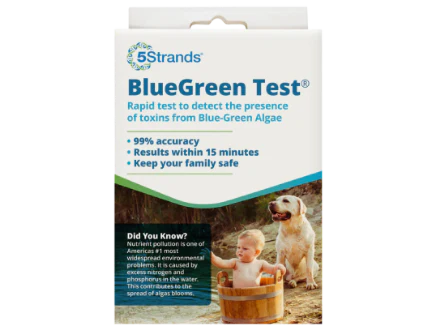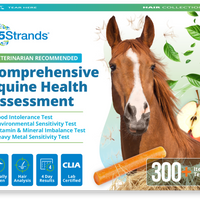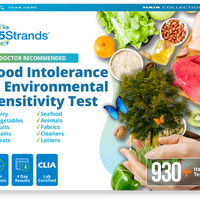Have you considered checking for potential nutrition deficiencies? Micronutrient deficiencies are one of the most prevalent forms of malnutrition, not only in the U.S, but also globally. Each deficiency has health ramifications, from increased risk of chronic diseases like diabetes and heart disease, to a weakened immune system, to adverse pregnancy outcomes, and heightened susceptibility to contagious diseases. Dr. Ty Beal, a global nutrition scientist at the Global Alliance for Improved Nutrition (GAIN), recently reported that most people across all regions and economic levels are not getting enough of various crucial micronutrients.
What are nutritional deficiencies?
So, how would you know what a nutritional deficiency is, and what are some of its tell-tale signs? For starters, a nutritional deficiency occurs when your body does not receive an adequate amount of one or several vitamins and minerals (e.g., Iron, vitamin C, Iodine, and B6), which are necessary for proper functioning, leading to an increased risk of several diseases. Nutritional or micronutrient deficiency has also been referred to as “hidden hunger” since many people lacking mild and moderate amounts of crucial micronutrients in their diet may not experience visible symptoms until the deficiency becomes more serious. When severe, these micronutrient deficiencies can manifest in distinct and well-known syndromes, such as goitre (iodine deficiency), scurvy (vitamin C deficiency), anemia (iron deficiency), and rickets (vitamin D deficiency).
Some common signs of nutritional deficiencies include fatigue, irregular heartbeat, hair loss, impaired brain function, vision problems, a weakened immune system, enlarged thyroid, and more. Evaluating your nutritional status and nutritional sensitivity are essential factors that can help determine whether you lack essential micronutrients in your diet. Through their bioresonance technology, a 5-Strand functional health assessment evaluates biomarkers to assess your micronutrient status and any micronutrient deficiencies.
How are vitamin and mineral deficiencies developed?
You may be thinking: how do people develop vitamin and mineral deficiencies and not even know it? Vitamin and mineral deficiencies are not common in people who have a wide and varied diet as a way of life. Nutritional deficiencies go through various stages, including adequacy (balanced levels of micronutrients), negative balance (lacking all the necessary micronutrients), decline in tissue stores (depletion of essential nutrients and organ damage), loss of function (symptoms of deficiency and organ failure), and death.
Nutritional deficiencies don’t happen spontaneously, but can develop over time in severity as a result of one or multiple reasons. Some significant factors are:
- Poor food intake: Poor food supply, poor food choices, difficulty eating or swallowing
- Poor absorption: Inflammatory bowel disease, alcoholic excess, coeliac disease
- Increased requirement: Weight loss recovery, growth, pregnancy, lactation, and chronic illness
- Increased losses: Burns and widespread skin disease, poorly-managed diabetes, renal disease
- Altered metabolism: Decreased gastrointestinal digestion and absorption, environmental pollution, drugs, alcohol excess, and disease
Other factors contributing to vitamin and mineral deficiency include different genetic polymorphisms and the use of certain medications.
List of 11 nutrient deficiencies
Discover a list of especially common micronutrient deficiencies you may be lacking in your diet.
-
Calcium Deficiency
An important mineral component in your skeletal system, essential for growth, bone mineralization, muscle contraction, heart health, and nerve function, calcium is one of the most commonly known nutrients lacking in adequate quantity in many people’s diets. An estimated 44.1% of the U.S. population does not meet the adequate requirement for calcium. In adults, calcium deficiency has been linked to bone fractures, falls, and osteoporosis. Menopausal women, people with lactose intolerance, and vegans have a higher risk of lacking this micronutrient. Calcium deficiency symptoms may include an irregular heartbeat, convulsions, numbness, and tingling. Great sources of calcium include: Dairy products, dark-green vegetables, salmon, sardines, and other boned fish.

-
Vitamin C Deficiency
A water-soluble vitamin, crucial for many bodily functions, including the healing of wounds and immune system health, vitamin C is another common nutrient that many people lack in their diets. Vitamin C is an essential physiological antioxidant; it aids in protein metabolism and is necessary for the biosynthesis of collagen, L-carnitine, and some neurotransmitters. Common signs of vitamin C deficiency include a weakened immune system, fatigue and weakness, slow wound healing, gum or nose bleeding, easy bruising, and in more severe cases, scurvy. Smokers, excessive alcohol drinkers, people with poor diets, and those with kidney disease on dialysis are at higher risk of vitamin C deficiency. Good sources of vitamin C are sweet red and green peppers, citrus fruits, kiwi, strawberries, broccoli,
-
Vitamin D Deficiency
Vitamin D deficiency is not very obvious, and symptoms may develop after years of lacking this vital nutrient in the body. This nutrient is a fat-soluble vitamin that works like a steroid hormone in your body. One of the most common forms of obtaining this nutrient is through the skin’s synthesis of vitamin D after sunlight exposure. It is reported that 94.3% of the US population does not meet the daily requirement for vitamin D. Vitamin D aids in calcium absorption, and its role in bone and muscle health has been well established. Vitamin D deficiency includes fatigue, susceptibility to illness, bone loss, and increased risk of fractures. People most susceptible to vitamin D deficiency are breastfed infants, people with darker skin, older people, and those with kidney or liver disease. Vitamin D is available in natural form only in a few food products, but can also be found in fortified foods such as milk, milk products, fatty fish, egg yolks, and cod liver oil.
-
Iron Deficiency
Iron is an important mineral that makes up a significant part of red blood cells, binding with hemoglobin and transporting oxygen to the body’s cells. The two types of iron are heme and non-heme. Heme iron is well-absorbed and is only found in animal products such as red meat. Non-heme iron is found in animal and plant products, and it is not well-absorbed. Iron deficiency is very common around the world, with more than 25% of the population lacking adequate levels. Anemia is a common symptom of this nutrient deficiency, and when left untreated, it can manifest as fatigue, headaches, and pale skin. This nutrient deficiency is most common in children, women of childbearing age, pregnant women, and vegetarians and vegans. You can find iron-rich food in red meat, shellfish, canned sardines, and some fortified foods. I have a wide range of iron-rich foods that I can easily incorporate into my vegan diet, avoiding any iron deficiency. Some of these foods include spinach, seeds, dark-leafy greens, beans, quinoa, and beets.

-
Folate Deficiency
Also known as B9 deficiency, inadequate levels of folate (B9) in the blood can impair proper body oxygenation. Folate is another vital nutrient that helps the body make red blood cells, which carry oxygen throughout the body for a wide range of organ functions. When the body doesn’t get proper oxygen, many of its organs and tissues will not function optimally. People with poor diets, those who drink alcohol excessively, and people who take certain medications are more susceptible to this nutrient deficiency. Pregnant women are also at risk, as a lack of folate during pregnancy has been linked to major birth defects. Some known folate deficiency symptoms include mouth sores, tender tongue, fatigue, lack of appetite, anemia, and neurological issues. You can find folate nutrients in seafood, eggs, leafy greens, citrus fruits, nuts, liver, dairy, meat, poultry, beans, and peas.

-
Iodine Deficiency
Iodine is another important nutrient that many people lack in adequate amounts. The National Institutes of Health (NIH) estimates that between 35-45% of the world’s population suffers from Iodine deficiency. This nutrient is essential for thyroid function and the production of thyroid hormones, critical in various physiological activities, including the regulation of calorie burn, metabolism, and brain health and development. In the human gut, this nutrient is metabolized to iodide, and healthy adults absorb over 90% of it. The most common symptom of iodine deficiency is an enlarged thyroid gland (Goiter). Iodine deficiency can cause serious health problems, especially for children. In extreme cases, it has been linked to mental retardation and developmental issues. Reproductive age women are a subgroup of the U.S. population where iodine deficiency is reported to be increasing. People living in areas where the soil is iodine-deficient are at higher risk of iodine deficiency. Good sources of iodine include: Dairy products, eggs, seaweed, fish, and iodized salt

-
Magnesium Deficiency
Magnesium is a vital mineral that helps transform food into energy, produces new proteins, aids in the regulation of the nervous system, and is needed for the body’s proper cellular function. Acting like an enzyme, it also keeps a stable heart rate, strong bones, and normal blood pressure. Hypomagnesemia is the medical term for magnesium deficiency, which includes symptoms like poor coordination, tremor, muscle spasms, migraines, loss of appetite, type 2 diabetes, metabolic syndrome, cardiac arrest, and seizures. Some risk factors for magnesium deficiency include old age, pregnancy, breastfeeding, disease, impaired digestive function, some medications, diabetes, and excessive alcohol consumption. Magnesium is found in plants and animal products, including dark, green leafy vegetables, nuts, seeds, whole grains, dark chocolate, avocados, black beans, and salmon.

-
Vitamin B6 Deficiency
Vital for brain development among the unborn, newborn, and toddlers, and proper immune system function, vitamin B6 (Pyridoxine) deficiency has been associated with deficiency in other B vitamins such as folic acid and B12. Vitamin B6 deficiency is one of the most common nutrition deficiencies in the U.S., with 10% of the population having low levels of this vitamin, according to the Centers for Disease Control (CDC). B6 vitamin deficiency symptoms include skin inflammation (Dermatitis), a weakened immune system, brain fog, irritability, neurological disorders, and mental health issues such as depression. Those at risk of vitamin B6 deficiency include individuals with renal disease and autoimmune disorders. Low levels of vitamin B6 deficiency can also result from interactions with some medications. Some good sources of vitamin B6 include fish, organ meat, poultry, grains, potatoes, chickpeas, fortified cereals, soy products, bananas, and non-citrus fruits.

-
Vitamin A Deficiency
Vitamin A is an important nutrient that is vital for healthy vision, skin, bones, and teeth, and aids in cell development and metabolism. Vitamin A deficiency can cause vision loss and blindness, and can lead to skin, heart, lung, tissue, and immune system issues. Prolonged inadequate intake of vitamin A is the main cause of this nutrient deficiency, which, according to the World Health Organization, is the leading cause of preventable blindness among children. Insufficient nutrition exacerbated by chronic inflammation from gastrointestinal (GI) issues has been linked to Vitamin A deficiency in regions of the developing world. Infants, children, women who are breastfeeding, and people with liver disorders are at risk of this deficiency. Vitamin A-rich foods include dark and orange vegetables like leafy greens, carrots, cantaloupes, and sweet potatoes. Other sources include organ meat and fish liver oil.

-
Vitamin B12 Deficiency
B12 vitamin is vital for proper nerve and brain function. It aids in the production of red blood cells and DNA, helping your body keep nerve and blood cells in optimal health. Vitamin B12 deficiency can cause physical, neurological, and psychological problems, including fatigue, nerve damage, anemia, confusion, and anxiety. Vitamin B12 is absorbed by your body after hydrochloric acid in your stomach removes it from the food it was in, and after B12 vitamin combines with a protein (intrinsic factor) made in your stomach. Only then is your digestive system able to properly absorb this important nutrient. People who do not eat animal products have an increased risk of this deficiency, with higher rates of deficiency in vegans in comparison to other vegetarians. As a plant-based eater (vegan), I have been able to incorporate B12 nutrients through fortified products, including some milk, nutritional yeast, and other plant-based products. You can find B12 nutrients in shellfish, organ meat, dairy products, beef liver, eggs, and some supplements.

-
Potassium Deficiency
Potassium deficiency, also known as hypokalemia, occurs when your body has low levels of potassium. Excessive loss of potassium in your digestive tract can occur as a result of diarrhea, vomiting, and the use of laxatives. Drinking excessive amounts of alcohol, medications, folate deficiency, and certain adrenal conditions can also contribute to potassium deficiency. Potassium is a vital mineral that carries an electric charge when dissolved in your bodily fluids. This nutrient is essential for your muscles, cells, and nerves to function properly, as well as for maintaining normal blood pressure. People with low potassium levels may experience weakness, fatigue, irregular heartbeats, and in severe cases, paralysis. You can find potassium nutrients in avocados, bananas, sweet potatoes, peas, pumpkin, cooked broccoli, spinach, leafy greens, dried prunes, tuna, cod, trout, rockfish, lima, pinto, and kidney beans.

Main Message
Nutritional efficiency is primary for disease prevention, healing, optimal physical and psychological performance, and overall well-being. Maximizing the incredibly beneficial impact of the nutrients in food can have a long-lasting effect on your life and those you love. While it can be challenging to prioritize a balanced lifestyle that incorporates nutritional products for prevention and healing, it is possible to make necessary changes. Don’t let a nutritional deficiency interfere with your health, well-being, and quality of life.



























